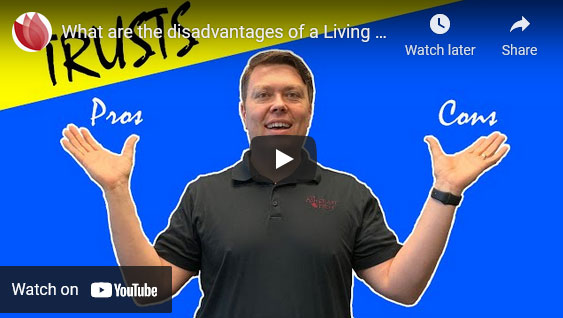
Why Your Inheritance is Smaller Than You Thought
September 10, 2020
Five Tips for Dealing with Harassing Creditors
September 10, 2020Today I'm going to answer the question "What are the disadvantages of Creating a Trust?"
Hi, I'm Greg with The Ashcraft Firm and today we're going to talk about the disadvantages of the living trust and I'm also going to talk to you about the advantages of a living trust so we'll compare this to a will so that you can see the difference and I'll do it up here on my whiteboard
Disadvantages of Making a Trust
First, I want to go over the disadvantages of a trust. Really, the big disadvantages of the living trust are all the things that go into making the trust.
Upfront Cost that Goes into Making a Trust
There's upfront time that you spend when you create that trust there's an upfront cost to creating a trust.
No Court Oversight
Another disadvantage of the trust might be that there's no court oversight to a trust.
Advantages of Making a Trust
No Court Oversight
On the flip side, that's also an advantage of a trust. No court oversight does sometimes lead to a disadvantage if you have beneficiaries that need oversight, but typically most people when they're creating a trust some of the advantages that they cite are that it's cheaper overall. If there's no court oversight, then we don't have to pay attorneys to go through the whole process. We don't have to pay the person to be there to type everything (court stenographer). Yes, that still happens in probate court. We don't have to pay for the same types of appraisals. Here in the state of California, these probate costs are really high.
Trust is Cheaper in the Long Run
I can calculate those probate fees for you. Let's say that all you had to put through a probate court is a house. Now, let’s say that house could be sold for five hundred thousand dollars. Now, this is the only item that we’re putting through probate and it's valued at five hundred thousand. Let's say that you have a loan on it four hundred thousand. You might think, “my estate is a hundred thousand dollars,” but that's not what the court looks at. The court looks at this five hundred thousand dollar (the gross estate). They pretend you don't have any debts.
The California legislature takes that five hundred thousand dollar figure and says that a probate attorney is going to get four percent of the first hundred thousand, which is four thousand dollars. Then they're going to get three percent of the next hundred thousand, which is three thousand dollars. Then it's two percent after that until you hit a million dollars. In the scenario, where we have a five hundred thousand dollar house going through probate we have three hundred thousand dollars left because we already have the first hundred then the second hundred thousand calculated. We have three hundred thousand dollars left and three times two so that’s six thousand dollars. We have four, plus six, plus three so that's thirteen thousand dollars. This is what an attorney gets paid to probate your five hundred thousand dollar house. Now, if you have to have a professional executor, then you multiply this number by two and so now we have twenty-six thousand. Now, we have twenty-six thousand dollars, plus there are another two thousand dollars for miscellaneous court fees: you have to publish things in the newspaper, you have to pay— as I said before— for the person to be there to type, you have to pay the court fee filing fees, and things like that. Those miscellaneous costs all add up to about two thousand dollars. If you didn't have to have a professional executor then we're looking at fifteen thousand dollars and if you did have to have a professional executor then you're looking at twenty-eight thousand dollars total. Those are all fees that you can save
your loved ones if you create a trust. That’s an advantage of a trust, but again some estates need that court oversight so it's kind of a double-edged sword.
A Trust is Less Time-consuming to Administer
There's also less time involved with administering a trust than there is going through probate. It can take varying amounts of time but it's at least nine to twelve months. This is when nobody's unhappy, everybody's skipping and holding hands through court. It still takes about a year to get through it. When you file the paperwork you have to wait for the court to appoint you as the person in charge. After you're the person in charge, you have a statutory period where you have to wait for creditors to file claims. Then, after you've waited for that period, you have to file something else saying, “hey court, I did everything I'm supposed to do, check my paperwork,” then you have to get another court hearing for that. Once you get that court hearing, you need an order in order to issue checks for all the beneficiaries. That whole process takes 9 to 12 months like I said if everyone is on the same page.
Now if you have people that aren't on the same page, then you have new problems. You can multiply the time required by two or three times.
A Trust is More Private because it is Not Public Record
Another problem with having court oversight is that nothing is private. Everything’s public and that that can be an issue in a lot of cases because then everybody knows what all of your beneficiaries are getting.
A Trust Gives the Trust Creator More Control
Finally, you have more control when you create a trust. One of the things you control is who's in charge. When you're in probate court— when you’re not doing a trust— then the judge is ultimately in charge. When you create a trust, you control who's in charge by appointing fiduciaries. When you create a trust, you can also control who gets what when. You get much more in your control than if you don't make a trust. You can control the way taxes are paid and things like that so there's a lot of advantages to creating a trust. If you want more information on taxes and things like that we have other videos here that you can take a look at about the different tax ramifications based on whether you create a will or trust.
That's going to wrap it up for us today, but again, if you like this video click the subscribe button click a like so that we know you like it.


